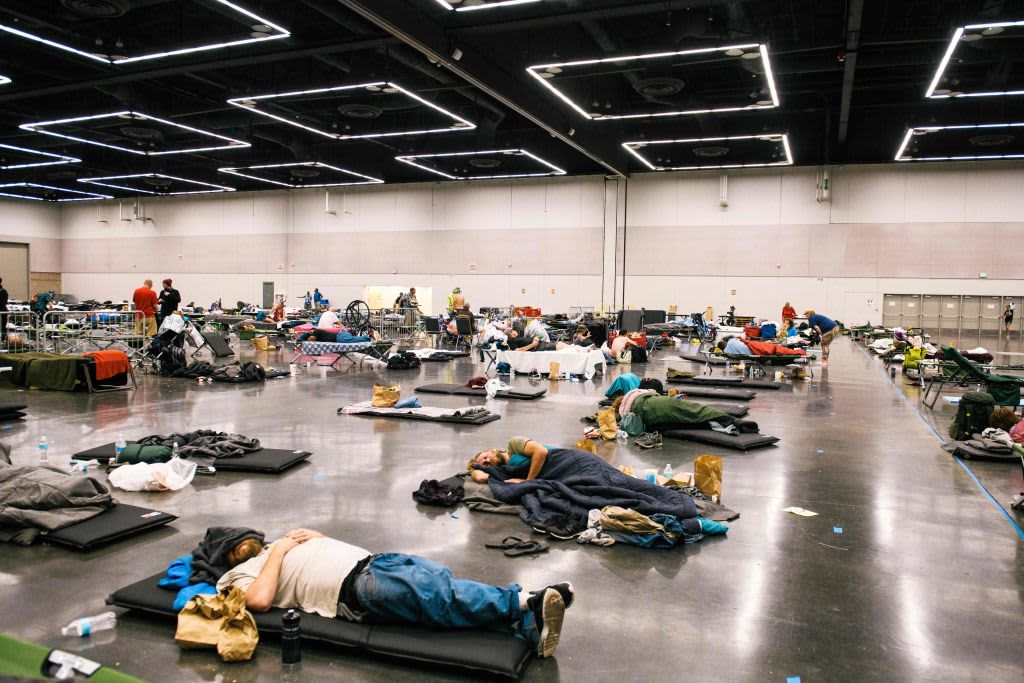
People rest at the Oregon Convention Center cooling station in Oregon, Portland on June 28, 2021, as a heatwave moves over much of the United States.
Kathryn Elsesser | AFP | Getty Images
The historic heat wave that’s scorched a great deal of the Pacific Northwest and caused record high temperatures in Canada has been blamed for hundreds of deaths in Oregon, Washington and British Columbia in the past week.
Oregon’s state medical examiner’s office said the extreme heat has killed at least 63 people in the state since Friday; 45 of those deaths were reported in Multnomah County, which includes Portland. The region saw temperatures reach a record high of 116 degrees Fahrenheit.
Dr. Jennifer Vines, Multnomah County’s health officer, said the preliminary cause of death was hyperthermia, an abnormally high body temperature resulting from an inability of the body to deal with heat. Many of the dead were found alone and without air conditioning.
“This was a true health crisis that has underscored how deadly an extreme heat wave can be, especially to otherwise vulnerable people,” Vines said in a statement.
“I know many county residents were looking out for each other and am deeply saddened by this initial death toll,” Vines said. “As our summers continue to get warmer, I suspect we will face this kind of event again.”
Shanton Alcaraz from the Salvation Army Northwest Division gives bottled water to Eddy Norby who lives in an RV and invites him to their nearby cooling center for food and beverages during a heat wave in Seattle, Washington, U.S., June 27, 2021.
Karen Ducey | Reuters
Lisa Lapointe, British Columbia’s chief coroner, said at least 486 sudden deaths had been reported between Friday and Wednesday, and the number is set to increase. The number of deaths represents a 195% increase over the roughly 165 deaths that would typically occur in the province over a period of five days.
“While it is too early to say with certainty how many of these deaths are heat related, it is believed likely that the significant increase in deaths reported is attributable to the extreme weather B.C. has experienced,” Lapointe said in a statement.
In King County, Washington, which includes Seattle, nearly a dozen people died from the heat on Wednesday, according to the medical examiner’s office. Two people were also found dead in their apartments on Tuesday due to apparent heat-related stress in Spokane, Washington.
“We cannot just turn up the AC; we have to turn up our level of efforts fighting the underlying cause of our changing world — climate change,” Washington Gov. Jay Inslee wrote Tuesday in a Seattle Times op-ed.
“Our recent discomfort is but the tip of the melting iceberg,” Inslee wrote. “What we felt this week is just the opening act in a looming global disaster.”
Human-caused climate change is creating more frequent and severe heat waves in the U.S. High temperatures this week also come as the West grapples with the worst drought conditions in the last two decades.
Isis Givens-Guttierrez, 9, cools off in Georgetown Playfield splash park during a heat wave in Seattle, Washington, U.S., June 26, 2021.
Karen Ducey | Reuters
Recent research found that more than one-third of global heat-related deaths during warm seasons can be attributed to climate change. In the U.S., heat kills more people than any other weather disaster.
During heat waves, lower nighttime temperatures that can provide relief from the hot daytime temperatures are also disappearing as the Earth warms, endangering people who don’t have air conditioning in their homes.
US President Joe Biden holds a briefing on wildfires ahead of the wildfire season with cabinet members, government officials, as well as governors of several western states including Oregon Governor Kate Brown (on screen), in the Eisenhower Executive Office Building in Washington, DC, June 30, 2021.
Saul Loeb | AFP | Getty Images
President Joe Biden, in a meeting Wednesday with Western governors, said climate change has driven a dangerous combination of extreme heat and persistent drought and that the U.S. is significantly behind in developing ways to combat worsening wildfires.
“Right now we have to act, and act fast,” the president said during the meeting, which was attended by the governors of Oregon, California, New Mexico, Nevada, Washington, Colorado, Utah and Wyoming. “The truth is we’re playing catch-up.”
The Earth has already warmed more than 1 degree Celsius compared with preindustrial levels, according to the World Meteorological Organization. Scientists have consistently urged an immediate reduction in greenhouse gas emissions to avoid the worst consequences of global warming.




